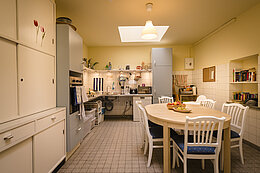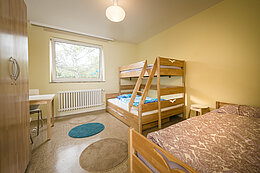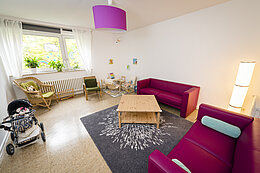The way to the women’s shelter is uncomplicated.
You simply call the emergency room for the Hamburg women’s shelters “24/7”.
This number can be reached at any time during the day or at night. Any woman who is suffering from any form of abuse or violence can contact us at any time.
You can also send us an email: schutz@24-7-frauenhaeuser-hh.de
Signing women can also contact us via the “Hilfetelefon gegen Gewalt” (Help Line Against Abuse). This service provides counselling in german sign language from 8 a.m. to 11 p.m. and can establish contact to us.
When you call us on the phone, we can arrange a meeting point. You can reach this meeting point by public transportation. We will collect you (with your children) at this point.
It is important for you to protect yourself and your children. Call the police (phone 110) in dangerous situations.The police can also escort you to the meeting point.
The emergency room is a protected area, and its address is secret. It gives you a chance to calm down and to think about your next steps. The women working in the emergency room will speak to you about your situation and what opportunities are available to you. You can go directly to a women’s shelter from the emergency room.
Any woman who has been a victim of abuse or who is threatened by abuse can come to the women’s shelter. We take in all people, who understand themselves to be women, regardless of whether they may be trans, or how their body may look and regardless of what is stated in their official documents.
One out of every four women in Germany have been the victim of abuse. They have suffered at the hands of their partners, family members, relatives or other persons. For many women (and their children), abuse is a part of their daily lives – regardless of their income or their level of education, how old they are or where they come from.
Are you afraid that no one will believe you?
We are here for you. We will believe you and support you (and your children).
If any important items are missing, we will help you to obtain them. We will provide you with dishes, bed linens and towels.
A women’s shelter is a protective home for women, both with and without children (Boys up to the age of 18), who are threatened by or who have suffered abuse. They receive temporary accommodation, protection, counselling and support here. If needed, an interpreter will come to the shelter to translate. Every women’s shelter has its rules, and they include keeping the address secret. This means, for instance, that residents cannot receive visitors.
In a women’s shelter, you live on the same floor with other women and children, and you share rooms such as the kitchen, bathroom, living room and garden. Women without children often share a room with other women. As a rule, women and their children are assigned their own rooms. You should be able to organise your daily life on your own.
Employees in the women’s shelter are all women who are committed to taking a stand for you (and your children). We do not give out any information about residents to third parties. We counsel and guide you to a life of self-determination by helping you to help yourself, and we speak several languages. If necessary, we work with an interpreter.
There are employees in the women’s shelter who take care of the boys and girls; they help the children to work through their experiences of abuse and stand up for their interests.


